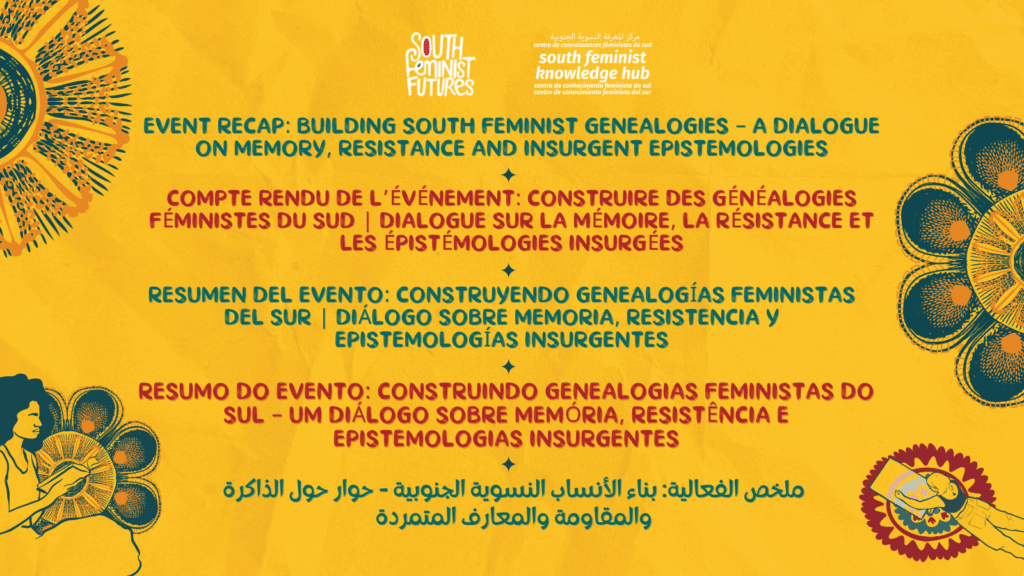
We marked the one-year anniversary of the South Feminist Knowledge Hub where we invited our community to journey with us through the living genealogies of Southern feminist thought and practice.
We ended the anniversary month with a thought-provoking panel discussion on “Building South Feminist Genealogies: A Dialogue on Memory, Resistance and Insurgent Epistemologies“. At the center of the dialogue was the concept of epistemicide – the systemic erasure of the knowledge(s) of structurally excluded peoples. The Knowledge Hub counters this and seeks to reclaim Southern feminist memory. The dialogue also held space to share the richness of materials our speakers and their collectives have produced – from Margarita’s feminist economics projects, to Danila’s theorising of epistemic ghosting, to Sally’s articulation of liberatory archives, to Michaela and Cases Rebelles’ collective and trauma-attentive methodologies. These powerful works live alongside many others in the Knowledge Hub, as part of its ever-growing multilingual catalogue.
Margarita Olivera, feminist economist and founding member of the Brazilian Network of Feminist Economics spoke of confronting a discipline that has long erased Southern women. “Economics is a field of knowledge that is quite hostile to women – and especially to women from the Global South.”
For Margarita, the purpose of feminist economics networks is more than theorising – it is about creating spaces for invisibilised, silenced, forgotten struggles. “We need to create a feminist economy that can interpret us, that can understand the experiences of what it means to be women navigating, internally, this struggle between the Global North and the Global South. An economy that recognises this historical process strongly marked by colonialism, slave-owning relations, the construction of elites, middle classes, strata of power, and also by the vast forgotten and invisible classes.”
Argentinian feminist philosopher, author and researcher, Danila Suárez Tomé explored how epistemic frameworks are shaped by power and how they can be challenged. Danila named another form of violence: when Northern knowledge systems and frameworks overwrite the specificities and contexts of Southern movements and societies. “Epistemic violence also occurs when our struggles and theories from the Global South are extracted from their context, reused elsewhere, and turned into intellectual commodities that then return to us stripped of their meaning.” The question is not just about intellectual recognition but really about power that determines who has the authority to produce knowledge and who is reduced to supplying “raw experience”.
Danila co-developed the concept of epistemic ghosting to articulate this violence – where the creators of knowledge are excluded from decision-making and “ghosted” by the very systems that extract their insights and present their knowledge as if it emerged from elsewhere. “To counter this, it is as important to theorise our own practices as it is to do our practice. We must generate situated knowledge, develop our own concepts, and produce theories rooted in our lands and activism.”
Feminist writer and educator, Sally Al Haq, who co-leads The Liberatory Archives and Memory at Whose Knowledge? reminded us that liberatory archives are created by communities who have been silenced or excluded from dominant archives and knowledge systems. Liberatory archives center people and communities, rather than institutions. They emerge from Southern epistemologies and refuse to extract and exploit marginalised knowledges. “Liberatory archives must be anticolonial and life-affirming. They should be grounded in self-knowledge and must never rely on consumerism or the exploitation of the marginalised.”
Sally drew on powerful examples such as The Palestinian Oral History Archive that contain thousands of interviews with displaced women and men in Lebanon. Similarly, the Palestinian Museum Digital Archive captures cultural heritage in ways that highlight the importance of museums, which shape community memory even for those who cannot physically visit them. These archives challenge official, institutional forms of archival knowledge, creating alternative narratives.
Afro Caribbean writer, documentarist, and co-founder of Cases Rebelles collective, Michaela Danjé, challenged the temptation to universalise feminist experience because it might seem like that would lead to more understanding and facilitate solidarity through mutual recognition – however, that’s not true. “I think that the more we strive for rigor, precision, and nuance, and also use comparison to enhance that precision, the better we avoid oversimplification.” Instead, Michaela emphasised nuance, rigour, and collective work: not just for conducting research together, but also for producing, writing, and creating together, without the need for individual recognition or the drive to promote oneself as an independent “entrepreneur.” “In my view, we need research, translations, and artistic works that are attributed to a collective, not to a group of individuals. We need to learn to relinquish the pursuit of individual recognition and instead invest in the community, finding satisfaction in the collective recognition that comes from such collaboration.”
Michaela pointed to the need for research communities to particularly integrate trauma considerations into their methodology – to ensure that trauma does not lead to silence or further marginalisation, because traumatised communities often lack the resources – both material and emotional – to fully participate in research. Michaela spoke of the urgent need for research to be designed as a space that heals and offers support, rather than one that causes further harm or re-traumatises participants.
While we marked one year of the Knowledge Hub, this is also the beginning of deeper connections, collective work, and resistance across regions, to resist epistemicide and extractivism. We want to create and sustain a space where Southern feminist knowledge thrives on its own terms. To build South feminist genealogies is to honour and remember our past, resist the present erasure of Southern knowledge by building a new knowledge base, and imagine insurgent and emancipatory feminist futures.
Check out the reading list on Building South Feminist Genealogies.
Visit the Knowledge Hub and help us grow its catalogue by adding resources you wish to share with fellow Southern feminists.
And tell us your experience through this survey that will help us enhance the Knowledge Hub!
If you missed or want to watch the session again, we will be sharing a recording soon!